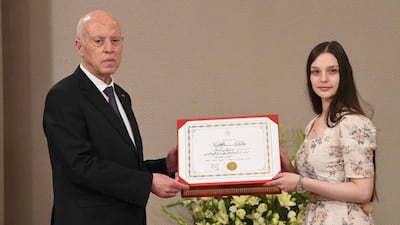The family of a young Tunisian who received a presidential academics achievement award confirmed that their daughter had received a liver transplant after a campaign gained the attention of an organ donor's relatives.
Sally Ben Salem, 22, received the award from Tunisian President Kais Saied on National Science Day in July last year after receiving the highest grade average among her peers at Sousse University's Higher Institute of Commerce.
But three weeks ago, she was diagnosed with hepatitis C and, after initially failing to find a donor, her doctors said that her only option was a split liver transplant, which is illegal in Tunisia.
Thameur Ben Salem, Ms Ben Salem's brother, had told The National that his sister’s health was deteriorating day by day at Hospital Fattouma Bourguiba of Monastir.
Tunisia only allows a liver transplant to take place when there is a clinically deceased donor available.
Ms Ben Salem's family said that despite the availability of such a match, the donor's family have not given their approval, which means split liver surgery is the only option.
The majority of liver grafts are transplanted with a whole organ. However, about one in 10 donated livers can be divided into two segments or grafts, known as split liver.
Only livers donated from younger, healthier donors are considered for splitting.
Mr Ben Salem said the Tunisian health minister had promised the family he would do his best to find a solution during a recent visit to Monastir, but that there have been no updates since then.
Following a massive campaign by Tunisians on social media, Ms Ben Salem received the life-saving surgery after a deceased young man's family agreed to donate their son's liver for the transplant.
Ms Ben Salem was transferred late on Monday night from Monastir to Mongi Slim Hospital in Tunis, where three teams of surgeons worked for 12 hours before successfully concluding the transplant at 9am on Tuesday.
“We still need to monitor her for 48 hours [to ensure the body does not reject the organ], but so far, the operation went well,” Tunis Regional Health Director Tarek Ben Naceur told The National.
The case revived the debate over the importance of organ donation, and Mr Ben Naceur hopes it will raise awareness among Tunisians on the overall benefits of the process.
“People do not take into consideration that we could all be in the position of this girl's family one day,” Mr Ben Naceur said.
“There are lots of reassurances provided to make sure that any organ donations process is transparent and is lacking of any aspects of nepotism.”
Mr Ben Naceur said that each year, the Ministry of Health organises public campaigns that bring together medical specialists as well as sociologists and religious leaders in an attempt to promote organ donation culture in the country.


